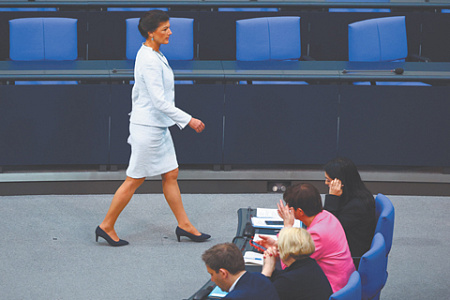
Due to the expiration of two months after the early elections on February 23, the Bundestag supervisory authority received 1,000 complaints from voters related to incorrect vote counting for the Sarah Wagenknecht Alliance. The party itself also filed a complaint alleging an erroneous counting of votes received by mail from German citizens living mainly outside the country. If the Alliance does get into the Bundestag after the recount, the agreed ruling coalition of the Christian Democratic and Christian Social Union (CDU/CSU) and the Social Democrats (SPD) will not be able to form a government without involving a third force due to insufficient mandates.
According to German media, the Alliance lacked just over 9,000 votes to enter the Bundestag. He independently counted the votes cast for him in writing and came to the conclusion that they would be more than enough for the party to enter parliament. The Alliance’s lawyers outlined these facts in their new complaint filed with the Bundestag supervisory authority.
The media notes that the filing of protests by individual voters is controlled by a new public organization called More Democracy. She intends, along with the Alliance, to seek a recount of written votes. In addition, the organization advocates for the reform of postal voting itself to make it more transparent.
German experts are debating whether it is really possible to challenge the elections. From a formal point of view, each participant, according to the election law, can file a complaint with the Bundestag indicating certain organizational shortcomings. It must be reviewed by a special committee of the Bundestag, formed and approved by Parliament. The Special Committee examines the complaint, expresses its opinion and sends it to the plenum of the Bundestag, which includes the President, his deputies and heads of committees. The final decision is made by the plenum.
In the event of a recount of votes and the Alliance’s passage to the Bundestag, the black-red coalition, consisting of the CDU/CSU and SPD bloc, loses its majority. In this case, CDU candidate Friedrich Merz may not be elected chancellor in early May. In other words, he will need to find another partner for his election, and the Greens may become such a partner.
But this will require a complete revision of the coalition agreement and the allocation of ministerial posts to the Greens. If we assume that there are still disputes over the seemingly already agreed upon coalition agreement between the CDU, CSU and SPD, then the wording of the new agreement will postpone the creation of a government for several more months. Of course, the country will not be left without leadership in such an “off-season”, and the previous red-green government headed by Chancellor Olaf Scholz will continue to fulfill its duties.
The alternative is new elections, in which the right-wing populists from the Alternative for Germany (AfD) may emerge victorious. Although the latest public opinion poll from April 22 showed that there are no changes in the mood of voters yet. CDU/CSU is supported by 25.6% of voters. They are followed by “AdG” with 24%. The SPD is in third place with 15%, and the Greens are in fourth place with 11%. The Left-wing Party, which now has 9%, has lost some of its voters’ sympathies.
Experts believe that the supervisory authorities of the Bundestag, as well as the parliament itself, will most likely recommend rejecting the request for a recount of votes. Then the Constitutional Court may have the last word. But consideration of this requirement may take months or even years. So Merz can be elected chancellor while the point is being made.
